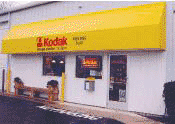City exploring options to traditional FBO
Shelly Sulser
Chronicle Editor
Saying Marshall City Manager Chris Olson wants more than any fixed base operator (FBO) can invest to keep the airport viable, Stan Lathrop has decided to drop his contract negotiations to provide fueling, aircraft repair services and a flight school under a new business name, Heritage Aviation, at the city-owned Brooks Field.
But according to Olson, the city’s airport losses have grown from $45,000 in 1998-99 to almost $90,000 expected in 2007-08.
“Out of the about $180,000 general fund operating deficit incurred last fiscal year, about $104,000 of that deficit can be attributed to the airport,” Olson told the council.
That’s why Olson is encouraging the council to consider other options including sharing and FBO with the city of Charlotte or striking a deal with a college aviation school to allow students to manage the airport as part of their training and education.
“He wants the airport to be revenue neutral,” said Lathrop of why he’s walking away. Lathrop has worked as chief skydiving instructor for Skydive Michigan at Brooks Field for 14 years and will continue to do so. “There’s no way I can pay out that kind of overhead. I’m going to head back to Grand Rapids and go back to work.”
During the winters, Lathrop works as a tool and die maker and spends his weekends teaching skydiving in Marshall during the warm months.
But because he has been laid off for the past five months, Lathrop has been volunteering to clean bathrooms, provide security and pump fuel for the city since April while working to hammer out a deal for his newly created FBO business to succeed Metzger Aircraft Services which shut down in February due to financial losses.
In light of Olson’s Oct. 18, six-page memo to Marshall city council members regarding the status of contract negotiations with Lathrop, and after meeting with Olson Tuesday, Lathrop resigned that volunteer position Wednesday.
A number of local pilots gathered to give Lathrop a farewell luncheon at the Moonraker and to show their support for his work.
“We’re very upset about it,” said pilot Mike Arlow of Marshall, whose Diamond Aircraft, 2003 DA 20-C1 model is kept in a Brooks Field hangar owned by Joe Newman of Battle Creek. “There’s going to be nobody from the city pumping fuel.”
While Arlow lives in Marshall, he is the owner of Technical Writing and Engineering Company in Troy.
Though he does much of his work at home, he often flies in about 45 minutes to Bloomfield Hills from Brooks Field, then drives to his office. His wife, Freda Arlow, is a physician at Marshall Internal and Family Medicine. He once flew her back to Marshall from Ann Arbor due to a medical emergency involving one of her patients.
“I fly in and out of here two to three times a week in the warm months,” he said. “With no FBO, there would be no reason for people to come to the airport.”
City officials said in July they hoped to have a new FBO on board by Oct. 1. It was around that time that the city’s airport board asked Marshall Public Safety Director Mike Olson (who did not comment for this report) to issue a request for proposals to see a potential FBO, airport board chairman Tom Woods said then.
Lathrop submitted a proposal and a business plan as did former Brooks Aero employee Robert Grady.
Previous talks with Great Lakes Aviation Services (GLAS) of Kalamazoo broke down when certain terms could not be met by the city.
“I’m disappointed by it,” said Lathrop. “I had financial backers and was ready to move. I gave them my business plan. I was going to be starting small and build up to what the business could support. I had a meeting with the city manager yesterday and he said there would be no fuel, the maintenance building would be locked up and there would be no access to anything. The doors will be locked tonight at sunset.”
But Olson said the decision to reject Lathrop’s business plan and ask for a revision Oct. 15 was based on a number of considerations including a price setting formula that would mean the city would always incur a loss on the fuel sales.
“What Stan said in his proposal was not in his business plan,” said Chris Olson. “Some services Stan was obligated to are expenses that were not covered in the business plan. My concern is that it was not in the best interest of the city to enter into a contract that is potentially harmful to either party. My sense is that neither of them (Lathrop nor Grady) realized it that the expenses they obligated themselves to could be hurtful to them and the city’s not going to take advantage of that situation.”
While the numbers of landings per week could not be pinned down due to the numbers of area flight school touch and go traffic, and because airport traffic often increases on the warm month weekends, Olson told the council members that airport manager Mitch Price has reported that clientele is 50 to 100 regular users.
“This is less than one percent of the city’s population,” wrote Olson, “and it is unknown how many of those persons are residents.”
Though Olson acknowledged that while the airport is used mostly by aviation hobbyists, it also provides some value to industries who may need components, electronic control boards or other parts, he said.
“It is my understanding that Schuler’s also receives several aviators who like to fly in to Marshall and dine there during the warm month weekends,” he wrote to the council. “There is a sentimentality and an architectural attractiveness of the airport as well. Thus, I assume that the airport has value for many persons, and that value could be tangibly supported.”
At the same time, however, he pointed out that he city has not filled positions in departments which serve the entirety of the population.
“In public safety, understaffing causes a significant amount of added overtime expense, but that is a topic for another day,” he said.
One reason for lack of revenue is the fact that the hangars, some 20 to 30, are privately owned meaning the city receives no rent income. The city does, however, receive 10-cents per foot from the land on which the hangars sit which generates only about $3,000 per year for the city.
And, rent from SkyDive Michigan is only about $300 per year.
“There has been a series of operational/business problems which has resulted in an inability to retain FBOS,” he said. “A 228-percent increase in operational spending since fiscal year 1998-99 due to the city pickin up an increasing amount of operating and maintenance expenses for the facility and grounds.”
He added that the city has spent about $128,400 on capital improvements, including the work authorized for this fiscal year, over the past 10 years.
“Substantive revenue opportunities, such as the city owning/renting hangar space, rather than individuals, have been missed over this period of time,” he said.
Lathrop explained that the hangar agreements call for the city to assumed ownership of the hangars after 30 years.
The earliest the city could acquire the oldest group of 10 to 20 hangars (one building) would be 2014, said Olson.
The city is also anticipating a major expense for the required, 10-year underground fuel tank inspection by the Michigan Department of Environmental Quality, which Price has said could cost anywhere from $10- to $16,000.
If the tanks fail inspection, the city would incur additional costs for either new liners or new tanks.
“If the underground tanks are as bad as some persons say they are (we do not have any soils or engineering reports) and that they will fail inspection next year, then the replacement of that facility without a revenue stream may not be possible,” said Olson.
Olson said he is working to obtain a more accurate cost estimate for the upcoming inspection by consulting with the environmental testing firm, BCI-Insight Environmental.
The imminent winter months will give the city time to hammer out a plan, said Olson.
“Typically, airport traffic drops right off after Nov. 1,” he said.
After consulting with Price and with Mike Olson, Chris Olson said he is contemplating the following options:
- Reducing airport expenses by going to an unsupervised status meaning the city would provide a landing strip that can be used as well as basic upkeep of the building and grounds. Potential savings: $50,000 annually.
- -Sharing an FBO with the City of Charlotte or another municipality.
- Internship management by aviation school airport management students.
- A card reader for the fuel tank that would allow pilots to purchase fuel.
Meanwhile, Arlow said he will be forced to divert to Branch County Airport for fuel and to Grand Rapids for aircraft maintenance at a certified Diamond mechanic.
“The airport is the gateway to the community,” said Arlow. “It’s important for commerce. This is a real slap in the face.”
Arlow, who calls Brooks Field his home base, said the only way to keep the airport active is make it a “gas and go FBO.”
He likened the airport to the city’s parks and recreation fields which he said do not generate revenue for the city.
“The parks and rec fields are certainly worth something and the airport is worth something,” he said. “The community has to decide what it places value on.”
Pilot Keith Rhoades agreed with Olson that the city lost its sustaining revenue opportunity years ago.
“It’s too little, too late in my opinion,” said Rhoades. “There are a number of things the city could do to make money here but they should have done it in the beginning, in building hangars and getting the rent. Instead, Mr. Newman had to.”
He added that the city does not have to rely on only one FBO.
“FBO is a misnomer,” he said. “You can have several FBOs. You can have one running a flight school, one running the soaring club. The city is the manager so the city should be managing it.”
Subscribe to:
Post Comments (Atom)






No comments:
Post a Comment